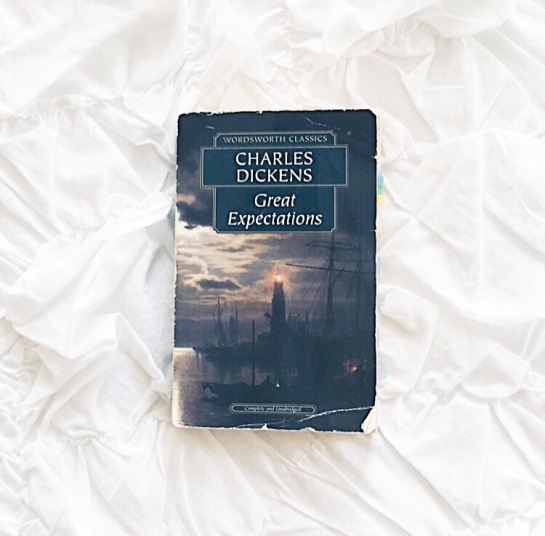
“Take nothing on its looks; take everything on evidence. There’s no better rule.” Great Expectations
There is no possible way to do this book justice in one blog post, but here’s a quick review anyway. Great Expectations, one of the greatest classics ever written, is set in Victorian England and tells the story of Pip, an orphan who faces monetary challenges, relationship struggles, and life-changing choices.
Pip’s tale begins with much excitement. The opening scene takes place in Kent, specifically in a graveyard, with an escaped convict preying upon Pip and ordering him to bring him “wittles” (food) and “a file” (small handsaw). The convict’s legs are still chained, and Pip is his only hope in escaping such a burden. Lucky for Pip, his brother-in-law is a blacksmith, so Pip is able to return with the convict’s demanded items after having been severely threatened if he did not. Though Pip plays no part in the convict’s capture, the convict is ultimately caught and taken back to the Hulks (old ships used as prisons), but from that point on, Pip’s journey becomes one of both great fortune and detestable misfortune.
Some scenes later, Pip is invited to the wealthy Miss Havisham’s house to play with her adopted daughter, Estella. After being exposed to the upper class, Pip’s view of the world changes, along with his ambitions and aspirations in life. He greatly desires to be wealthy and to leave his life of blacksmith apprenticeship behind. He falls in love with Estella, who treats him with utter contempt, yet his ultimate hope is to become a gentleman to both impress her and win her heart.
Interestingly enough, Pip receives word that he has been given a large inheritance (his great expectations), and he moves to London to – that’s right – become a gentleman. While there, he comes to believe that Miss Havisham is his mysterious benefactor and that he will one day marry Estella. Pip meets Herbert, and the two become the best of friends, but Pip’s relationships at home in Kent become strained. Pip learns much in London, including the truth about the circumstances that brought him there and the real desires of his heart.
Much of Pip’s focus is on his shortcomings; he is constantly upset with himself at his failure to be better child in Kent with his sister and brother-in-law, his miserable attempts to impress Estella, and his awkwardness in becoming a gentleman in London. Yet Dickens seems to encourage his readers to look at Pip’s actions, not just his words. Pip deals with much internal conflict as he learns he must live with the choices he makes, but his great adventures, conflicts, gains, losses, and changes allow Pip to develop as a character while also giving the reader the ability to easily connect to Pip.
Dickens is known for his development of character, but his style and the choices he made as an author are certainly worth appreciating: the importance of the settings and their reflections of Pip’s journey; the development of themes; the characters, objects, and elements of symbolic nature; the depth of the allusions made; and the beautiful imagery Dickens creates. Critics disagree about the worth of the numerous coincidences (often involving characters) which are so prevalent in Dickens’s works. Regardless of your take on the happenstance of the characters’ relations, you’ll likely agree that Dickens was very creative in his creation of such coincidences.
So much can be learned from Pip’s journey into adulthood, including the need for loved ones, the unimportance of wealth, and the value of staying true to who you are. If you’ve never read Great Expectations, you’re missing out on a story from which much can be learned. Happy reading!
“That was a memorable day to me, for it made great changes in me. But, it is the same with any life. Imagine one selected day struck out of it, and think how different its course would have been. Pause you who read this, and think for a moment of the long chain of iron or gold, of thorns or flowers, that would never have bound you, but for the formation of the first link on one memorable day.”
Great Expectations